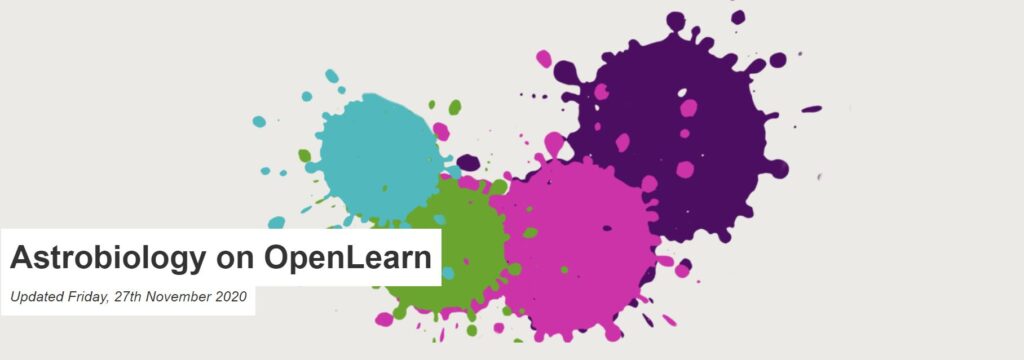
Dr Ann Grand, The Open University
Astrobiology is (to slightly mis-quote Douglas Adams) ‘… big. Really big. You just won’t believe how vastly, hugely, mind-bogglingly, big it is’.
For AstrobiologyOU, the research group that I’m part of, it’s not enough to study life on Earth and in space.
Not enough to look here and on other planets and their moons for evidence that life exists or might have existed.
Nor even enough to explore the environments that support, could support or might once have supported life on Earth or elsewhere in the Universe.
If you would like to know more about the work of AstrobiologyOU and the people who are doing it, please explore the Astrobiology Collection or visit the AstrobiologyOU website.

The AstrobiologyOU Logo
AstrobiologyOU also aims to address the commercial, governance, educational and ethical challenges of astrobiology research and the ways communities around the world can engage with and apply astrobiology research.
The challenge was to find a way to share the range of AstrobiologyOU’s work with as many people as possible. OpenLearn, the Open University’s gateway to thousands of free and openly available learning resources, numbers its visitors in the millions, so it seemed like a good place to start.
However, OpenLearn is designed as a place for learning, not for showcasing, so I had to find a way to work within the framing that OpenLearn allowed.
When I searched OpenLearn for ‘astrobiology’ in early 2020, it unearthed just a few articles, some of which were quite old, so I proposed creating a new Astrobiology Collection of linked articles that would reflect the many facets of astrobiology as we embrace it in AstrobiologyOU and make the work of our researchers available to a potentially huge audience.
Sure that OpenLearn must hold more astrobiology-related material, I used a range of other search terms (such as ‘planets’, ‘icy moons’, ‘Mars’, ‘space’) to find potentially relevant material, then worked with colleagues to review the articles that emerged. From these, we selected twelve that formed the nucleus of the new Collection.
But this still left gaps in the content and I had to decide on the best way to fill them. Interviews – a tool I often use in my work – offer direct access to people’s insights and understanding and allow them to describe their experiences in their own terms. Through interviews, I have explored the work of colleagues, from PhD students to academics to support staff, across AstrobiologyOU. From these fascinating conversations, we have co-created articles like this one on Exploring the icy moons.

An artist’s impression of the Milky Way, Earth’s ‘home’ galaxy
Other colleagues have written articles about their work, like this one on Sustainable and responsible space exploration. There’s also interactive content, like this exploration of Mars, and short courses, like this one on the moons of the Solar System. Altogether, we’ve almost doubled the size of the Collection and we’re continuing to build – as I’m writing this, there are three new articles in the pipeline.
The important thing about building any collection, of course, is that it stays together. The OpenLearn creative team helped set up the Collection and supports us as it expands. A collection must also be easy to explore and help its visitors to engage with ideas. Some visitors come in knowing what they’re looking for, while others are content to browse until they spot something that looks interesting.
To help visitors discover our material, we make sure each resource is tagged with labels that describe its content. So if – for example – a visitor types ‘international development’ into the OpenLearn search box, they will (eventually!) land on an article about the intersections between international development and astrobiology, which they might not have expected.
From there, they could wander to an article on what Earth can tell us about Mars, a short course on microgravity or information about studying with the Open University.
So, to accurately quote Douglas Adams, ‘Don’t Panic!’ Learning is meant to be a journey of discovery and surprise. I hope you enjoy your journey through these resources as much as I did in collecting and curating them.
